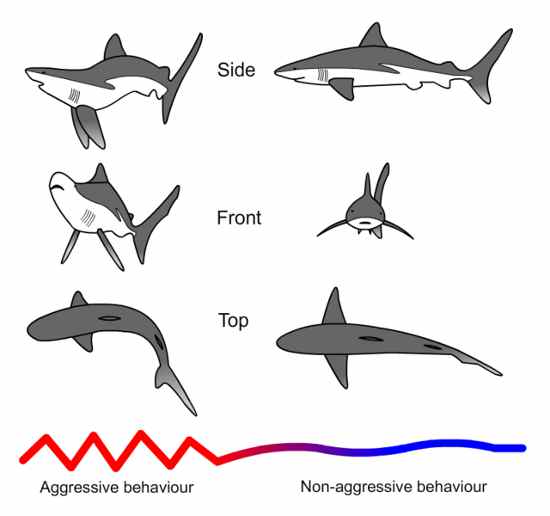Shark Behaviour
Staying safe while interacting with sharks
Shark behaviour is complex and unpredictable and it takes many years of study to understand it properly.
However, if you plan to dive or swim with them, it pays to know at least the basics of shark body language. And you should pay particular attention to signs of shark aggression.
Aggressive Shark Behaviour
Understanding Shark Behaviour
Now, we are in no way experts and we advise you not to leap into the water with anything bigger than a pilchard based on what you've read on this, or any other website.
Seriously, while human beings are not on the menu, sharks are still wild animals. You wouldn't get out of your car on a safari and point a camera in a lion's face unless you were an expert yourself, or in the company of one.
Please be sure that you, or someone you're with, has the necessary knowledge of the local area and its inhabitants before you dive. Right, that's the health and safety angle covered.
So why are we writing this page?
Well, mainly because shark behaviour and body language is fascinating, but also, because if you do encounter sharks on a dive it's always a good idea to have at least an inkling of what they might be thinking.
Sharks are highly intelligent and curious animals. They are also very cautious. Chances are they will keep their distance and, if you keep yours, you'll have the wonderful experience of observing these magnificent creatures in their natural habitat.
However, every shark is different and, occasionally they may become aggressive towards divers. This could be because they feel threatened in some way, or because there is food in the vicinity.
Dos and Don'ts
First of all do your research. Make sure you know what type of sharks you're likely to meet. Also be sure to find out about important dive safety info such as sea temperature, visibility, currents, tides, depths etc.
Poor visibility immediately puts you at a disadvantage when diving with sharks. With high tech gadgetry like lateral lines and Ampullae of Lorenzini, they have ways and means of locating you when you can't see a thing.
Before you even get into the water plan the dive well. Make sure you and your buddy know exactly how you're going to get out of the water if things don't go the way you expected them to.
Brush up on your underwater communication skills too. Wildly gesticulating hands might look like food to a shark.
Get in and out of the water with as little fuss as possible. The quieter you are, the less likely you are to startle the sharks. A frightened shark is a dangerous shark.
Once you're in the water, relax and enjoy the experience. Sharks are incredible animals and it's a privilege to see them in their natural environment. The more relaxed you are the more relaxed the sharks will be.
Be very cautious around juveniles, though, as they can be more curious and less laid back than the adults.
Keep tight control over your buoyancy and, if you can, try to stay horizontal in the water. Sharks are not used to seeing upright creatures and your height may make them nervous.
Try as much as possible to look like a non-threatening part of a natural marine environment. Just make sure it's not a seal.
Stay close to your buddy but, if you're diving with a group, don't all huddle together. You might look like something huge and intimidating and, at best, scare the shark off or, at worst, provoke a defensive attack.
Often it's enough to back away and give the animal a little more space, but if he continues to display aggressive behaviour, exit the water quickly and quietly.

Be polite!
Safety is not just about shark behaviour, it's about yours too. Remember, this is the shark's home, not yours. Let him come to you if he wants to.
Never lunge at any marine animal, especially those with big teeth. Don't come between he shark and his route to safety. Make sure he can always swim into open ocean if he wants to get away.
Don't stare. Never lose sight of the animals but don't stare directly at them. You don't like being stared at and neither do they.
Never feed the sharks. If there is food in the water there's no telling how the sharks will react. The last thing you want is to find yourself in the middle of a gang fight over a piece of raw fish.
Finally, a bit of crazy lady advice. Listen to your gut. If a situation doesn't feel right then 9 times out of 10 it isn't. Never ignore your own internal early warning system. Rather get out of the water for no reason than stay in and risk an incident that could get you, and the shark, into trouble.
Return to World of Sharks from Shark Behaviour
Recent Articles
-
Thresher Sharks
Aug 27, 14 10:51 AM
Thresher sharks are unmistakable with that huge upper lobe on the caudal fin. Let's find out more about them. -
Sharkwater
Aug 14, 14 12:42 PM
Sharkwater is a documentary by Rob Stewart highlighting the plight of the sharks in our oceans. -
Natural Cleaners
Aug 13, 14 08:57 AM
Natural cleaners and homemade skincare products are not only better for the environment, they're better for you and your family.
